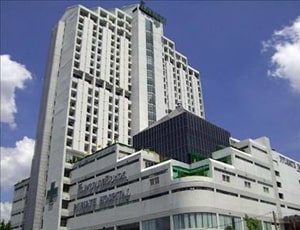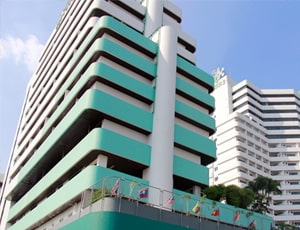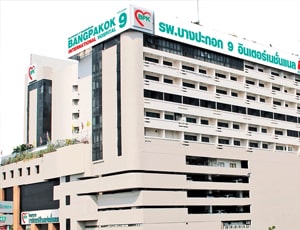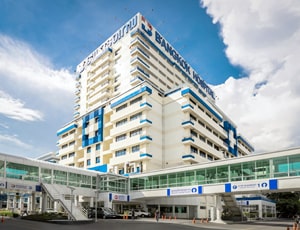The average cost of Breast Cancer Treatment in Bangkok approximately ranges between USD 12200 to USD 13420
Treatment cost

Types of Breast Cancer Treatment in Piyavate Hospital and its associated cost
| Treatment Option | Approximate Cost Range (USD) | Approximate Cost Range (THB) |
|---|---|---|
| Breast Cancer Treatment (Overall) | 6630 - 13216 | 238445 - 481666 |
| Surgery | 4535 - 8903 | 162226 - 327139 |
| Radiation Therapy | 89 - 280 | 3138 - 10063 |
| Chemotherapy | 333 - 776 | 12037 - 28650 |
| Targeted Therapy | 779 - 2054 | 27856 - 72231 |
| Hormone Therapy | 89 - 284 | 3162 - 9931 |
| Immunotherapy | 3962 - 7914 | 139397 - 280892 |
| Palliative Care | 88 - 172 | 3271 - 6145 |
SPECIALITIES
FACILITIES & AMENITIES

Types of Breast Cancer Treatment in Phyathai 2 International Hospital and its associated cost
| Treatment Option | Approximate Cost Range (USD) | Approximate Cost Range (THB) |
|---|---|---|
| Breast Cancer Treatment (Overall) | 6834 - 13529 | 238661 - 482462 |
| Surgery | 4432 - 8863 | 160292 - 318717 |
| Radiation Therapy | 88 - 276 | 3138 - 10041 |
| Chemotherapy | 331 - 778 | 12095 - 28475 |
| Targeted Therapy | 798 - 2058 | 27779 - 72895 |
| Hormone Therapy | 92 - 282 | 3186 - 10080 |
| Immunotherapy | 4016 - 7929 | 139277 - 274897 |
| Palliative Care | 91 - 171 | 3218 - 6107 |
DOCTORS IN 11 SPECIALITIES
FACILITIES & AMENITIES

Types of Breast Cancer Treatment in Bangpakok 9 International Hospital and its associated cost
| Treatment Option | Approximate Cost Range (USD) | Approximate Cost Range (THB) |
|---|---|---|
| Breast Cancer Treatment (Overall) | 6611 - 13450 | 237525 - 486298 |
| Surgery | 4483 - 8825 | 161267 - 325663 |
| Radiation Therapy | 92 - 281 | 3258 - 9993 |
| Chemotherapy | 337 - 796 | 11953 - 27497 |
| Targeted Therapy | 803 - 1980 | 28268 - 71019 |
| Hormone Therapy | 89 - 280 | 3164 - 10015 |
| Immunotherapy | 3983 - 7795 | 137860 - 282185 |
| Palliative Care | 88 - 170 | 3258 - 6122 |


Types of Breast Cancer Treatment in Bangkok Hospital and its associated cost
| Treatment Option | Approximate Cost Range (USD) | Approximate Cost Range (THB) |
|---|---|---|
| Breast Cancer Treatment (Overall) | 6866 - 13387 | 243609 - 489001 |
| Surgery | 4443 - 9040 | 157524 - 316785 |
| Radiation Therapy | 91 - 276 | 3208 - 10213 |
| Chemotherapy | 340 - 791 | 12208 - 27991 |
| Targeted Therapy | 801 - 2038 | 27786 - 70805 |
| Hormone Therapy | 90 - 276 | 3172 - 9893 |
| Immunotherapy | 3997 - 7927 | 140522 - 278141 |
| Palliative Care | 88 - 169 | 3247 - 6099 |
DOCTORS IN 13 SPECIALITIES
FACILITIES & AMENITIES
Breast cancer is a type of cancer that originates in the cells of the breast. While it can occur in men as well, it is far more prevalent in women.
Following skin cancer, breast cancer stands as the second most frequently diagnosed cancer among women in the United States. However, it's crucial to recognize that breast cancer is not exclusive to women, as everyone is born with some breast tissue, making it a condition that can affect individuals of any gender.
Improved breast cancer screening techniques enable healthcare providers to detect the presence of breast cancer at an earlier stage. Early cancer detection greatly increases the chances of effective therapy and recovery.
The exact reason that causes breast cancer is unclear, even though every eighth woman suffers from it. However, several factors have been associated with the development of breast cancer. Some of the breast cancer risk factors include:
The risk of breast cancer naturally increases as women age. The risk is also higher in women who have a family history of breast or ovarian cancer, possess BRCA1 and BRCA2 genes, or have had their periods before the age of 12.
The main types of breast cancer are based on where the cancer begins, whether it's in the ducts or lobules of the breast, and whether it has spread beyond its original location. The two broad categories are in situ (confined to the site of origin) and invasive (has spread beyond the original location). Here are some common types:
Most commonly, as a part of treatment for breast cancer, surgery is conducted to remove the cancerous lump or growth from the breasts. Depending on the extent of the cancer and its stage, surgery may be accompanied by another form of treatment as well, which is conducted either before or after the surgery.
The doctor decides upon a breast cancer treatment plan that is most suitable for the patient. The decision may depend upon the extent of spread, the overall health of the patient, the stage, and the type of breast cancer (inflammatory, cancer during pregnancy, lobular carcinoma, ductal carcinoma, and invasive breast cancer).
The team that conducts breast cancer treatment includes a surgeon, a medical oncologist, and a radiation oncologist. The different breast cancer treatment options are divided into two types:
Local Treatment: This type of treatment is localized, that is, it is only used to treat one specific location or primary site affected by cancer. It does not have any impact on the rest of the body.
The following are the two types of local treatment:
The radiation can either be delivered externally or by placing a small radioactive pallet in the affected area internally. The latter form of radiation therapy is known as brachytherapy.
II. Systemic Treatment: This type of treatment involves the use of drugs that can be administered either orally or intravenously. The choice of drugs depends on the type of systemic treatment opted for, which, in turn, is dependent upon the extent and the type of cancer.
The recovery journey following breast cancer treatment, though generally less painful and traumatic than some other critical cancers, brings about certain adjustments for patients. These changes encompass various aspects of their physical and emotional well-being:
Options like cosmetic surgery provide avenues for individuals to regain a sense of normalcy.The unique challenges that breast cancer survivors face underscore the importance of comprehensive support, encompassing physical, emotional, and psychological aspects. While the journey may have its complexities, addressing these changes with a tailored and holistic approach contributes to individuals' overall well-being and resilience in their recovery.
Ask your healthcare adviser for the best multiple options and choose the one that meets your expectations
The cost of Breast Cancer Treatment in Bangkok starts from $12410. In Bangkok, Breast Cancer Treatment is conducted across many multispecialty hospitals.
Different hospitals have different pricing policy when it comes to the cost of Breast Cancer Treatment in Bangkok. Some of the best hospitals for Breast Cancer Treatment offer a comprehensive package that covers the end-to-end expenses related to investigations and treatment of the patient. The treatment cost usually includes the expenses related to hospitalization, surgery, nursing, medicines, and anesthesia. Stay outside the package duration, port-operative complications and diagnosis of a new condition may further increase the Breast Cancer Treatment cost in Bangkok.
There are several best hospitals for Breast Cancer Treatment in Bangkok. Some of the most renowned hospitals for Breast Cancer Treatment in Bangkok include the following:
After Breast Cancer Treatment in Bangkok, the patient is supposed to stay in guest house for another 26 days. This is important to ensure that the surgery was successful. During this time, control and follow-up tests take place to check for medical fitness.
Apart from the Breast Cancer Treatment cost, the patient may have to pay for additional daily expenses such as for guest house after discharge and meals. The per day extra expenses in Bangkok per person are about 25 USD.
After the Breast Cancer Treatment surgery takes place, the average duration of stay at the hospital is about 4 Days. During the recovery, the patient is carefully monitored and control tests are performed to see that everything is okay. If required, physiotherapy sessions are also planned during recovery in hospital.
There are more than 4 Hospitals that offer Breast Cancer Treatment in Bangkok. These hospitals are approved to perform the surgery and have proper infrastructure to handle Breast Cancer Treatment patients. Apart from good services, the hospitals are known to follow all standard and legal guidelines as dictated by the local medical affairs body or organization.
Some of the most sought after doctors for Breast Cancer Treatment in Bangkok are: